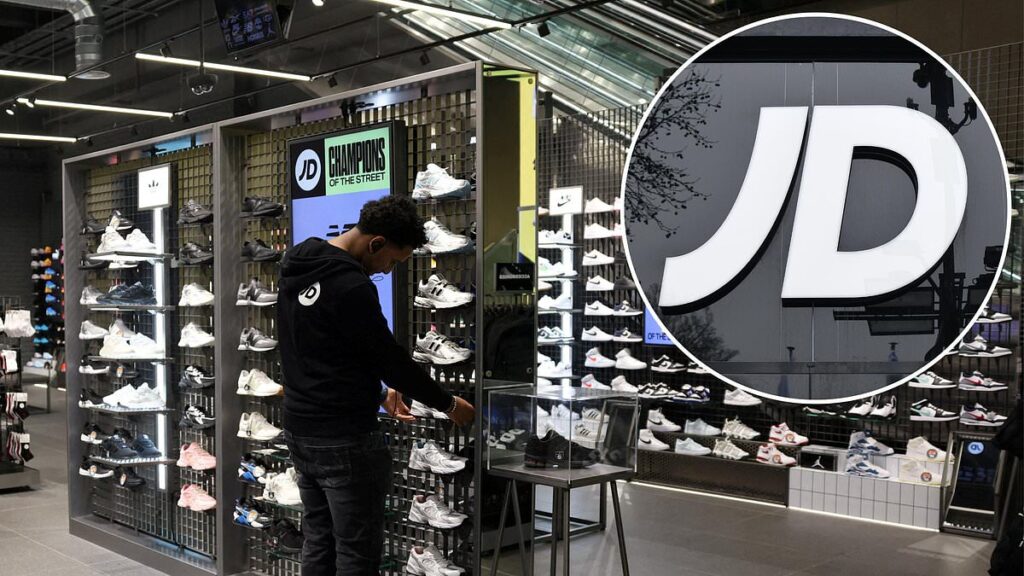- The company’s annual pre-tax profits guidance range is £955m to £1.04bn
- It noted a ‘volatile trading environment’ and subdued sales during October
Updated:
JD Sports Fashion shares plunged on Thursday after the retailer warned annual profits would likely be near the bottom end of forecasts following ‘volatile’ trading last month.
The group told investors that October trading was impacted by higher discounting levels, unfavourable weather conditions, and subdued consumer spending, with the retailer citing the US presidential election as a possible factor.
JD Sports anticipates pre-tax profits for the year ending February 2025 will be towards the lower end of its £955million to £1.04billion guidance range due to a ‘volatile trading environment’ and subdued sales during October.
The sportswear company’s shares plummeted by 17 per cent in early trading before recovering modestly to be around 14 per cent lower at 97.3p just before midday.
Bury-based JD Sports has hoped to become one of the few British retailers to achieve £1billion in annual pre-tax profits, a feat only shared by Tesco, Marks & Spencer, and Screwfix owner Kingfisher.
However, it missed the target last year, blaming milder weather in late September and ‘elevated market promotional activity,’ especially over the peak Christmas season.

Challenging backdrop: JD said last month’s trading was impacted by higher discounting levels, unfavourable weather conditions, and subdued consumer spending
The company’s like-for-like revenues have increased by around 0.5 per cent since the start of the year, although organic turnover has risen by 6.1 per cent.
JD has enjoyed strong growth in Europe and North America, where its organic sales expanded by 10.1 per cent and 9.1 per cent, respectively, in the nine months ending 2 November.
This offset flatlining demand in the UK, where the business previously sold multiple non-core brands, such as Tessuti, Nicholas Deakins, and Pretty Green, to Mike Ashley’s Frasers Group.
Régis Schultz, chief executive of JD Sports Fashion, said: ‘We have performed well in the key trading events this year, and we are well positioned for the upcoming peak season.’
JD has expanded its store estate by over a third to 4,541 outlets since early February, largely through gaining 1,179 shops as part of its takeover of American sporting goods supplier Hibbett.
Another acquisition deal it has agreed – the €520million purchase of French trainers seller Courir – recently received conditional approval from regulators in Europe.
The European Commission ordered the company to sell all Courir stores in Portugal and some shops in particular French regions to Snipes.
Aarin Chiekrie, equity analyst at Hargreaves Lansdown, said JD ‘is taking a risk by expanding capacity ahead of market recovery’.
He added: ‘It’s not likely to become a jewel in the crown any time soon, but it could pay dividends down the line when market conditions and consumer confidence improve.’
Founded in 1981, JD Sports has been stepping up its acquisition spree over the past few years, buying majority stakes in the likes of Crete-based Cosmos Sport and Spanish retailer Deporvillage.
DIY INVESTING PLATFORMS

AJ Bell

AJ Bell
Easy investing and ready-made portfolios

Hargreaves Lansdown

Hargreaves Lansdown
Free fund dealing and investment ideas

interactive investor

interactive investor
Flat-fee investing from £4.99 per month

Saxo

Saxo
Get £200 back in trading fees
Trading 212
Trading 212
Free dealing and no account fee
Affiliate links: If you take out a product This is Money may earn a commission. These deals are chosen by our editorial team, as we think they are worth highlighting. This does not affect our editorial independence.
Compare the best investing account for you
Share or comment on this article:
JD Sports shares tumble as sportswear retailer softens guidance
Some links in this article may be affiliate links. If you click on them we may earn a small commission. That helps us fund This Is Money, and keep it free to use. We do not write articles to promote products. We do not allow any commercial relationship to affect our editorial independence.










